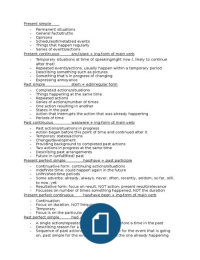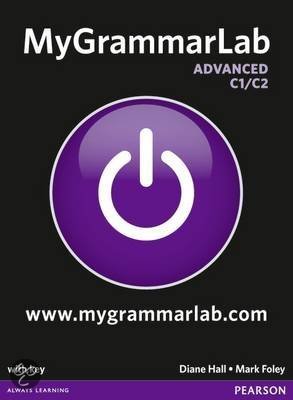Present simple
- Permanent situations
- General facts/truths
- Opinions
- Schedules/timetabled events
- Things that happen regularly
- Series of events/actions
Present continuous am/is/are + ing-form of main verb
- Temporary situations at time of speaking/right now (, likely to continue
after that)
- Repeated events/actions, usually happen within a temporary period
- Describing something such as pictures
- Something that’s in progress of changing
- Expressing annoyance
Past simple stem + ed/irregular form
- Completed actions/situations
- Things happening at the same time
- Repeated actions
- Series of actions/number of times
- One action resulting in another
- States in the past
- Action that interrupts the action that was already happening
- Periods of time
Past continuous was/were + ing-form of main verb
- Past actions/situations in progress
- Action began before this point of time and continued after it
- Temporary states/actions
- Change/development
- Providing background to completed past actions
- Two actions in progress at the same time
- Describing past arrangements
- Future in (unfulfilled) past
Present perfect simple has/have + past participle
- Continuative form: continuing actions/situations
- Indefinite time: could happen again in the future
- Unfinished time periods
- Some adverbs: already, always, never, often, recently, seldom, so far, still,
to now, yet
- Resultative form: focus on result, NOT action: present result/relevance
- Focusses on number of times something happened, NOT the duration
Present perfect continuous has/have been + ing-form of main verb
- Continuation
- Focus on duration, NOT frequency
- Temporary
- Focus is on the particular activity
Past perfect simple had + past participle
- A single action/repeated actions completed before a time in the past
- Describing reason for a past action/situation
- Sequence of past actions: past perfect simple for the event that is going
on, past simple for the event that interrupts the one already happening
, - Superlatives (overtreffende trap), ordinals (rangtelwoorden), the only,
ever, etc.
- Unfulfilled intentions
Used to/would
- Both describe actions that happened regularly in the past but happen less
now or not at all
- If the first sentence uses ‘used to’, in the next you have to use ‘would’
Past perfect continuous has/have been +ing-form of main verb
- Actions before a time in the past: for/since
- Action that was still ongoing at time of statement
- Do NOT use when number of actions is mentioned
There are four basic conditional patterns where our choice of tense
depends on:
1. The time of the condition (past/present/future)
2. How possible or impossible we think the event is
Zero conditional: -Possible at any time, bust -If your car is old, it
-No auxiliary ‘will’ most commonly in the probably needs a road test.
-Present simple present -If you use a hot iron on
-Often used for actions that nylon, it melts.
always have the same -If/When you press this key,
result the game starts.
-‘If’ can be replaced by
‘when’ when referring to a
regular activity
First conditional: -Possible future -If the result of the test is
-Present simple (if-clause) events/situations and their negative, you’ll receive
+ will + inf (main clause) results notification through the
-Offers, suggestions and post.
warnings -Shall we go out tomorrow
-Imperative (in main if the weather’s good?
clause!) -If you get home late, be
quiet!
Second conditional: -Unlikely future event or -If the result of the test
-Would or modal verb in situation were positive, we would
main clause -Unreal current event or call you within two days.
-Past simple, continuous or situation, which is contrary (We expect negative
was going to in the if- to known facts. Therefore is results)
clause impossible to fulfil the -If the police were
-Should/were to + inf condition confident of their case
emphasises that the against Sykes, surely they
condition is unlikely to would take him into
happen custody? (police isn’t
confident)
Third conditional: -Unreal/imagined -If the sea defences hadn’t
-Past perfect (if-clause) + situation/event in the past collapsed, New Orleans
would/wouldn’t have/modal -Express criticism or regret, wouldn’t have been
verbs (e.g. might/could often with could have flooded.
have) (main clause) -If you’d been driving more
-Continuous forms can slowly, you could have
occur in both clauses stopped in time.






